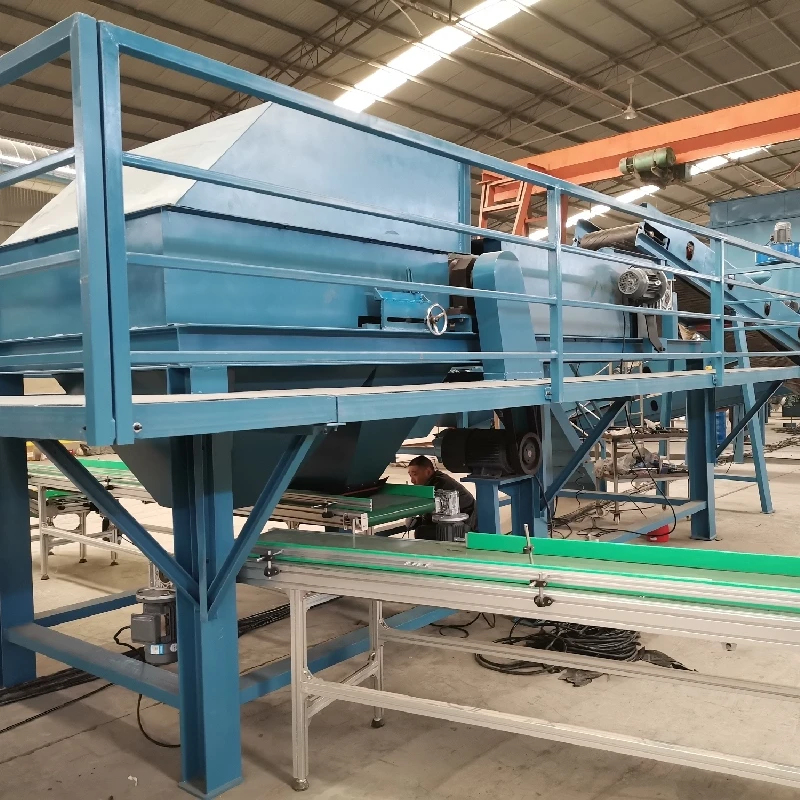

Dec . 12, 2024 02:00 Back to list
Understanding Non-Ferrous Metal Separators A Vital Tool in Recycling
In today’s environmentally conscious society, the importance of recycling cannot be overstated. As we strive to reduce waste and conserve natural resources, the recycling of metals, particularly non-ferrous metals, has gained significant attention. Non-ferrous metals, which include aluminum, copper, lead, zinc, and nickel, are essential in various industries due to their properties, such as resistance to corrosion, lightweight nature, and excellent conductivity. To effectively recover these valuable materials from waste, non-ferrous metal separators have become an indispensable tool.
What Are Non-Ferrous Metal Separators?
Non-ferrous metal separators are specialized machines designed to sort and separate non-ferrous metals from other materials, such as plastics, ferrous metals, and organic waste. These separators utilize advanced technologies, including sensors, magnets, and air classifiers, to ensure that only the desired non-ferrous materials are collected for recycling. By employing these systems, recycling facilities can significantly improve their efficiency and profitability while minimizing the ecological footprint of waste disposal.
Types of Non-Ferrous Metal Separators
There are several types of non-ferrous metal separators, each utilizing different methods to achieve the same goal efficient separation of metals from other materials. The most common types include
1. Eddy Current Separators These are widely used in recycling facilities for separating non-ferrous metals from mixed waste streams. Eddy current separators utilize magnetic fields to induce electric currents in conductive materials, causing them to repel and move away from non-metallic materials.
2. Air Separation Systems These systems use air pressure to separate light materials, such as plastics and paper, from heavier non-ferrous metals. By blowing air through the material stream, lighter materials are carried away while the denser non-ferrous metals fall to the bottom for collection.
3. Magnetic Separators While primarily used for ferrous metals, certain magnetic separators can efficiently remove iron impurities from non-ferrous metal streams, ensuring a higher purity level in the final recycled product.

4. Optical Sorters These high-tech machines utilize advanced camera systems and sensors to identify and separate non-ferrous metals based on their color and shape. Optical sorting is highly effective in reclaiming valuable metals from complex waste streams.
Benefits of Non-Ferrous Metal Separators
The implementation of non-ferrous metal separators in recycling operations offers numerous benefits
- Increased Recovery Rates By effectively separating non-ferrous metals from waste, these separators help facilities achieve higher recovery rates, maximizing the quantity of recyclables processed.
- Cost Efficiency Efficient separation reduces the need for manual sorting, lowering labor costs and allowing for faster processing times. This enhances the overall profitability of recycling operations.
- Environmental Impact By promoting the recycling of non-ferrous metals, separators significantly contribute to reducing landfill waste and decreasing the need for virgin raw materials. This helps preserve natural resources and minimizes energy consumption required in metal production.
- Quality Improvement With advanced sorting technologies, the purity of recycled non-ferrous metals is improved, making them more valuable for industrial applications.
Conclusion
Non-ferrous metal separators play a crucial role in the recycling industry by efficiently recovering valuable materials from waste. Their ability to enhance recovery rates, reduce costs, and improve environmental sustainability makes them a vital asset for modern recycling facilities. As technology continues to advance, we can expect even more innovative solutions that will further optimize the recycling process, ensuring that non-ferrous metals are reclaimed effectively and responsibly. In our quest for a sustainable future, embracing such technologies is essential for building a circular economy where resources are reused and waste is minimized.
Latest news
Troubleshooting Common Eddy Separator Problems
NewsJul.04,2025
The Role of Metal Recycling Plants in Circular Economy
NewsJul.04,2025
The Impact of Recycling Line Pickers on Waste Management Costs
NewsJul.04,2025
Safety Features Every Metal Shredder Should Have
NewsJul.04,2025
How Industrial Shredders Improve Waste Management Systems
NewsJul.04,2025
How Cable Granulators Contribute to Sustainable Recycling
NewsJul.04,2025